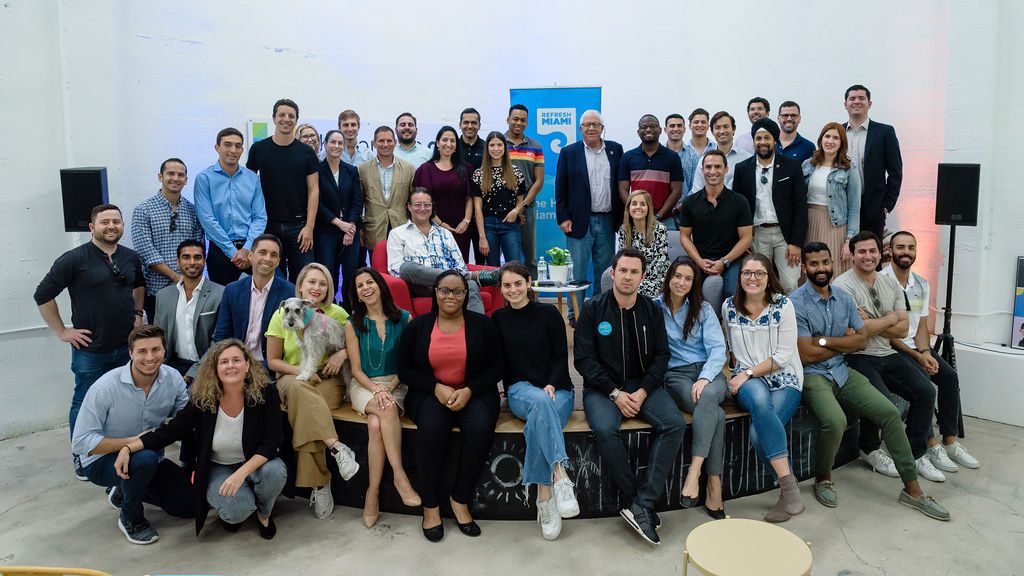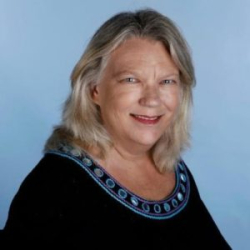By Alexina Prather
Brad Feld wears many hats but is most recognized for his work as an author, founder, startup community builder and venture capitalist. Last week, Refresh Miami hosted Feld. co-founder of TechStars, for a fireside chat at TheVentureCity, and members of Miami’s startup community took advantage of the opportunity to join the conversation. Maria Derchi Russo, Executive Director of Refresh Miami, joined Feld on stage to lead a Q&A styled discussion about building entrepreneurial ecosystems. Members of the audience all received a copy of Feld’s book, Startup Communities: Building an Entrepreneurial Ecosystem in your City.
 The conversation touched on general ideas about how to build community — Feld was a significant force in the rise of Boulder’s startup ecosystem — but also narrowed in on what this looks like in relation to Miami’s unique ecosystem. Typical of Miami, there was a diverse audience of more than 60 people from Miami’s entrepreneurial community — including founders, leaders of accelerators, investors, tech employees, university leaders and community organizers — all connected by a common interest in building community and expanding Miami’s entrepreneurial ecosystem.
The conversation touched on general ideas about how to build community — Feld was a significant force in the rise of Boulder’s startup ecosystem — but also narrowed in on what this looks like in relation to Miami’s unique ecosystem. Typical of Miami, there was a diverse audience of more than 60 people from Miami’s entrepreneurial community — including founders, leaders of accelerators, investors, tech employees, university leaders and community organizers — all connected by a common interest in building community and expanding Miami’s entrepreneurial ecosystem.
Here are five key takeaways from Feld’s talk:
What is For-Profit Philanthropy?
When people tell Feld there are no investors in a specific city, Feld asks, “are there any rich people in your town?” If there are, it becomes the duty of the startup community to teach those high net worth individuals to do what Feld calls for-profit philanthropy, specifically and intentionally investing in the innovation economy for the greater good. “For-profit philanthropy is investing in startups.” Feld sees this as crucial for a city to be vibrant long-term. The educational process of teaching this to individuals with the ability to make investments is work the local startup community and ecosystem builders need to do.
The importance of storytelling
Feld believes that the most interesting measurements a community can share are the measures that have to do with connectivity, and the value of information that travels across those connections made. This can be difficult to display, and is why people often don’t measure it. Despite the challenges, a story has the opportunity to bring a qualitative measurement to life, and as communities we should focus on how we can better share our stories and focus less on the numbers.
Flying under the radar isn’t always a bad thing
Helping entrepreneurs that are flying under the radar in any given community is best done when you are able to learn their motivation for being under the radar, and perhaps community builders can help them find other ways to help the community, other than being visible at events. Although it is important to highlight success, Feld added that “You can be under the radar and very successful, and still have a lot of input and impact on the startup community.” We must remember that being visible in a startup community isn’t a required attribute in order to create change. Still, he said, it’s a good practice for founders to spend at least 10% engaging with the startup community in some way.
Not a zero sum game
Startup communities should be valued by their positive sum games, a term that Feld has coined. As humans we are programmed to think about winners and losers but there is value in turning this phrase around. Rather we should focus on how we can be additive to each other even in times of competition and remember that both sides can win and have positive returns.
The future of Venture Capital
Last year, for the first time, the total amount of money invested in venture capital was less than 50% in the US. Venture capital has gone global. An area that used to be very concentrated, is growing and expanding. There are many cultural and legal nuances that pertain to different countries, but the philosophies around venture capital and innovation are widely spread; it isn’t a subject that gets stuck by geographic location. While it is impossible to predict when the next VC downturn will come, he said: “I think we have really democratized entrepreneurship and innovation globally, and that has unlocked an enormous amount of capital around the world for entrepreneurs and innovation after a long stretch of time when it was not unlocked around the world, and i think that will serve entrepreneurs well over at least the next 10 to 20 years.”
Feld, author of the startup bible Venture Deals now in its 4th edition, added, “You want to start a company, you need to go to Silicon Valley, is no longer the narrative and that makes me very happy.”
To learn more about Brad Feld please visit https://feld.com/

- Human ingenuity, inspiration, a call to action: Miami Tech Talent Coalition takes the stage at eMerge Americas - April 24, 2024
- Miami Tech Month, where developers get their own conference, VCs take the stage, and anything is POSSIBLE - April 23, 2024
- Full circle moment for Johanna Mikkola, the new CEO for Tech Equity Miami - April 22, 2024





